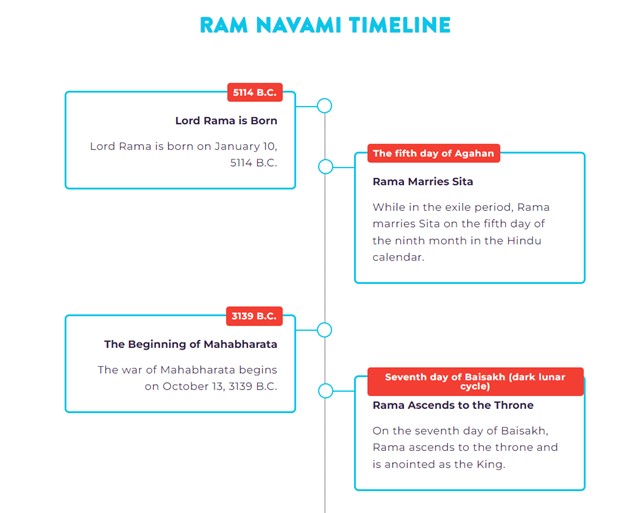Contribute
| Know The Significance Of Ram Navami |
Sunil Kumar D. and Indrajeet Tyagi
04/18/2024
Know The Significance Of Ram Navami
by Sunil Kumar D. and Indrajeet Tyagi
Rama Navami, the spring festival carries special importance for all Sanatanis as it signifies the birth of Ram, the seventh incarnation of Lord Vishnu, in Ayodhya. The day is celebrated with joy and fervor across India, and the globe. Along with Ram, devotees also commemorate Sita, Lakshman, and Hanuman for the place they held in Lord Ram’s life. According to Sanatana calendar, Ram Navami falls on the ninth day of the bright half that is the Shukla Paksha, in the month of Chaitra, and is a part of the Chaitra Navratri. According to the Gregorian calendar, the festival comes in March or April every year.
In 2024, Ram Navami is on 17 April. Rama Navami Madhyahna Muhurat – 11:22 AM to 01:54 PM. Navami Tithi Begins – 01:23 PM on 16 April 2024.
Lord Rama was born during Madhyahna period, which is the middle of the day. The mid-point of Madhyahna marks the moment when Shri Rama was born and temples symbolize this moment as birth moment of Lord Rama. The chanting of Shri Rama and celebration reach their peak during this time. The exact time to celebrate birthday of Lord Rama falls between 11 a.m. and 1 p.m. for most Indian cities.
How is Ram Navami celebrated in general
On the auspicious day of Ram Navami, devotees immerse themselves in prayers, stories, and recitals from the epic of Ramayana and hold special Abhishekam, Pujas and Aartis of miniature idols of Ram, deck them up with new clothes and ornaments, and place them in a cradle. On the birthday of Lord Rama, Bhajans, chanting of appropriate mantras all day long and Kirtan programs are held in temples and homes where artists perform songs and plays dedicated to Lord Ram. They will also offer Lord Rama flowers and fruits. Religious institutions organize special discourses and reading sessions of Ramayana and Shri Ram Charita Manas followed by community meals and charitable events. Additionally, there will be processions of and rocking of smaller versions of Lord Ram statue in a cradle, drinking of a sweet, peppered Jaggery beverage, fasting until evening, and feasting during the evening.
Disciples observe fasting for the day in the honor of their god. While some choose to abstain from food and water in totality, some limit their meals to Fruits and milk. Eight Prahar fasting is suggested during Rama Navami. Which means devotes should observe the fast from sunrise to sunrise. Rama Navami Vrat can be observed in three different ways, casual (नैमित्तिक) -which can be observed without any cause, continual (नित्य) - which can be observed throughout life without any desire and desirable (काम्य) - which can be observed to fulfill any desire
How is Ram Navami Is celebrated in Ayodhya?
Ayodhya is birthplace of Lord Ram and Ram Navami celebrations in Ayodhya are remarkable. Devotees come to Ayodhya from far-flung places. After taking holy dip into river Sarayu, devotees visit Rama temple to participate in birthday celebrations. The festival is most zealously celebrated at his birthplace, Ayodhya, where chariot processions, called Rathayatras or Shobha Yatras are taken out. Apart from Ayodhya, Ram Navami celebrations in Sita Samahit Sthal (Uttar Pradesh), Sitamarhi (Bihar), Rameshwaram and Ramanathaswamy Temple (Tamil Nadu), and Bhadrachalam (Telangana) are also worth experiencing.
What is the History of Ram Navami?
Ram Navami is celebrated to commemorate the birth of Lord Rama to the king of Ayodhya, King Dasharatha, who had three queens, Kaushalya, Sumitra, and Kaikeyi. The three queens were unable to give birth to a child for a very long time.
King Dashratha performed a sacred ritual known as “Putrakameshti Yagna,” which was suggested by a sage, Vasishtha. In the ritual, the king served ‘Payasam’ to all his wives to fulfill his wish of having a child. As a result, the king was blessed with a baby boy on the ninth day of the Sanatana month, Chitra. Queen Kaushalya gave birth to Lord Rama, whereas the other queens gave birth to Lakshmana and Bharata.
Although this day is declared as a holiday in many Indian states, it is celebrated on different days. People celebrate this day by going to temples, observing fasting and seeking Lord Rama’s blessings. This spring festival clearly promotes the idea of the victory of good over evil.

You may also access this article through our web-site http://www.lokvani.com/
